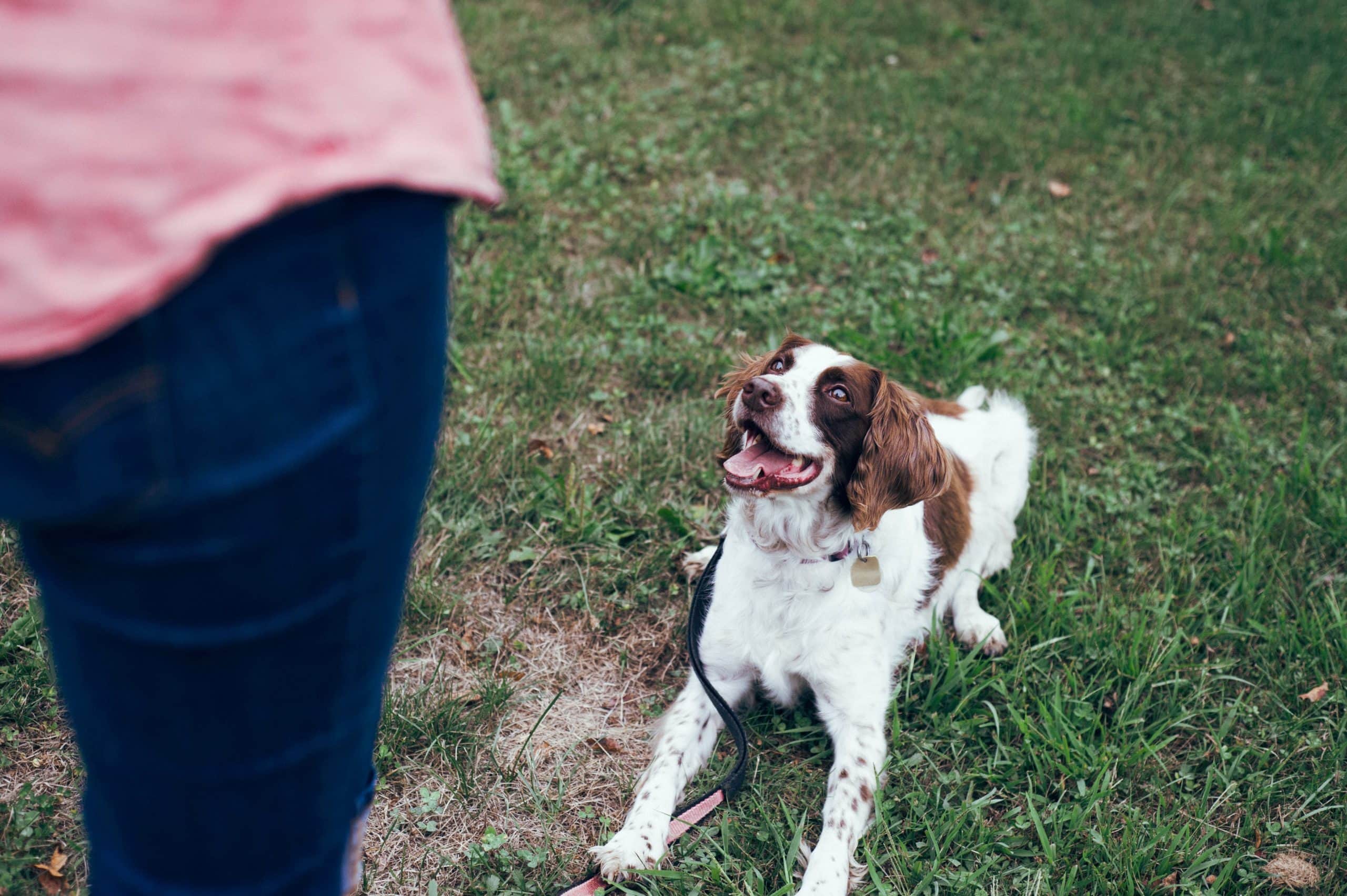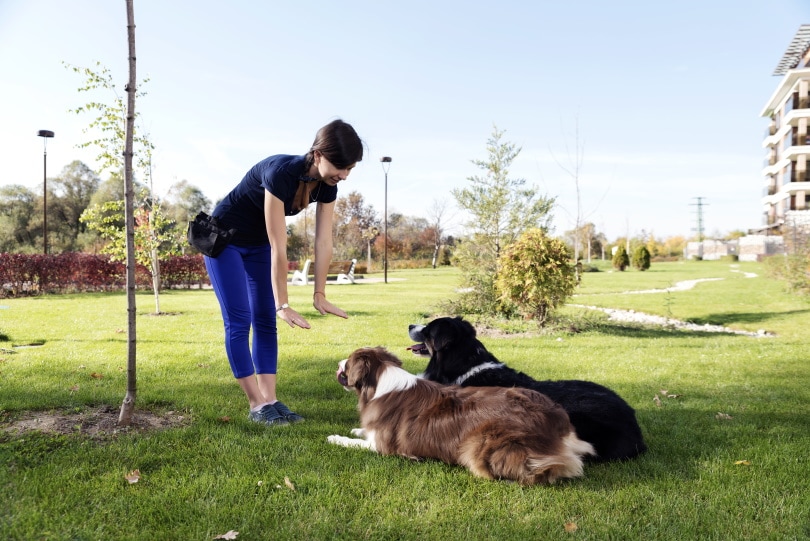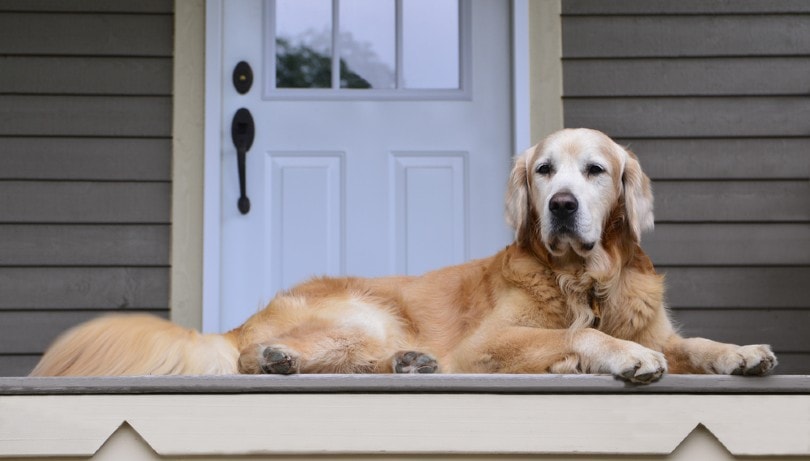
Does your dog start barking like crazy whenever you have guests over? Not only is it embarrassing for you and uncomfortable (or maybe even scary) for your visitors, but it also stresses out your dog.
The problem is that your dog has no idea that what he’s doing is wrong. Barking is a canine instinct. It’s how they communicate. Dogs bark to say hello, warn you of potential danger, and to express how they feel.
Still, we want them to understand that there’s a time and place for barking—and it’s not when you’re welcoming someone into your home.
The good news? Just like teaching them how to sit or fetch, you can also teach your dog to stop barking at visitors using the step-by-step guide we’re sharing below.
Why Does My Dog Keep Barking at My Guests?
Before you can stop your dog from yapping at visitors, it is important to figure out why he’s barking in the first place. Here are some of the most common reasons for this behavior:
1. Your Dog Thinks They’re Protecting You
Dogs bark to alert their owners of danger, and this may explain why your dog barks at visitors. Some dogs feel the need to protect the home from anyone they don’t know.
This is especially the case with smaller dogs that are more likely to feel threatened when someone new comes into their territory.
In other words, your dog is actually trying to be a good boy, even though you don’t like how they’re doing it.

2. Your Dog Wants Attention from Your Guest
If your dog has always been the center of attention and is used to getting all the pets, treats, and cuddles, she might bark at visitors because she wants their attention, too. Can’t blame a pup for trying!
3. Your Dog Is Bored
Barking can be a way for dogs to entertain themselves if they’re bored and want something fun to do.
If you’ve recently noticed that your dog barks more than usual when guests come over, this may be a sign that he needs more toys or daily activity in his life.

4. Your Dog Lacks Training and Socialization
This is one of the top reasons why a dog might bark at visitors. Training and socialization are critical to having a well-behaved companion.
Dogs that aren’t used to seeing other people—or haven’t been taught the right way to act around guests—may feel scared, overexcited, or unsure about how to interact with new people.
This can cause them to bark in order to show their emotions. The longer the barking goes untrained, the more ingrained the habit becomes, making it harder to break over time.
How to Train Your Dog to Stop Barking at Visitors
Once you’ve diagnosed the root of the barking, it’s time to train it out of your dog. Follow these steps:
1. Set Your Dog Up for Success
The first step to training your dog is one that you’ll be glad you took: setting up your dog for success.
This includes making sure they have everything they need, like enough food and exercise, as well as ensuring that they’re not going to be able to get into trouble.
For example, if you don’t want your dog barking at visitors through the door, keep them away from the door when people are visiting.

2. Keep the Visits Down for a While
The next step is to limit visitors until your dog learns how to behave around them.
Try inviting people over one at a time and only for short periods of time so that it’s easier for both you and your dog to stay calm and focused during training sessions.
And if possible, keep kids from visiting while you’re training—they often get very excited which can make things harder on everyone involved!
3. Brief Your Guests About the Training
Before you can begin the training process, you’ll need to inform your family and friends of what’s going on so they don’t accidentally sabotage your progress.
Don’t forget to explain what you want them to do when they do come over. For instance, do you want them to ignore the dog completely? Maybe call you before they arrive so you can prepare your dog? Having supportive guests will make the training even more effective.

4. Teach Your Dog the “Quiet” Command
Once you’ve made sure everyone is on the same page regarding this new training, you can get started.
Teach your dog the “quiet” command with the help of a friend or family member who is willing to play along.
Have them knock on the door or ring the doorbell, then instruct your dog to bark until you give him or her the “quiet” command. Once your dog stops barking, reward him or her with a treat and plenty of praise!
Repeat this process until it becomes second nature for your pooch to stop barking when they hear someone at the door.
5. Don’t Punish Your Dog for Making Mistakes
When training your dog to stop barking at visitors, never punish them for making mistakes. This will only make them more afraid of visitors and of you. Always remember that they’re trying their best.
Instead, just ignore any bad behavior—don’t give it any attention, either good or bad—and then give them lots of praise when they do something good. They’ll catch on eventually. Dogs are super smart creatures, after all!

6. Practice, Practice, Practice
Practice is the name of the game here! Once your dog understands the concept of being quiet on command, practice it as often as possible. Keep sessions short and do it several times a day until they’ve mastered it completely.
7. Keep Increasing the Difficulty Level
You’ve worked hard with your canine buddy for days on end and you’ve finally reached a point where they stop barking at everyone who walks into the room.
But now, you have to make sure that they don’t start to regress by keeping the difficulty level high and slowly increasing it over time.
That means testing them more often with different types of visitors (friends, family members, strangers) and in more challenging situations (like during deliveries).

Conclusion
If barking has been your dog’s default reaction to visitors for a long time now, it will take time for them to unlearn that behavior.
It won’t happen overnight, but with lots of patience, practice, and love, you’ll soon have a dog who greets visitors with a calm demeanor and a wagging tail, not non-stop barking.
Keep working at it – you and your best buddy will get there!
Featured Image Credit: alexei_tm, Shutterstock









